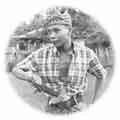
HOME
WEDDING
CUSTOMS
| Tausug Marriages: |
| Introduction: The Tausug People |
| Part One: Courtship |
| Part Two: Arranged Mariages |
| Part Three: Abduction and Elopement |
| Part Four: Weddings and Divorces |
Philippine Muslim (Tausug) Marriages
on Jolo Island
Philippine Muslim (Tausug) Marriages
on Jolo Island


This excellent photo essay about weddings on Jolo Island was written by Dr. Thomas Kiefer of Harvard University (email: [email protected]). Some of the material here is adapted from his book, "The Tausug: Law and Violence in a Philippine Moslem Society", Holt, Rinehart, Winston, 1972). We have divided the article into five parts for your reading pleasure.
Introduction: the Tausug People
Although the Philippines is predominately Christian, there are many Muslims in Mindanao and the Sulu Archipelago, identified by several major ethnic-language groups, including Maranao, Samal, Yakan, Magindanao, and Tausug. The Tausug dominate in Sulu - about 250,000 live on the Island of Jolo. They are Muslims noted for their fierce resistance in the face of Spanish, American, and, most recently, Philippine national governmental attempts to control them. In the last thirty years the area has seen considerable strife between the national government and various nationalist groups, including the Moro National Liberation Front (MNLF), the Moro Islamic Liberation Front and the radical Abu Sayaaf movement.
The main town of Jolo is a small city and there are concentrated towns along the coasts, but the majority of Tausug are rural rice farmers and fishermen. Tausug settlements are dispersed in the interior, with houses located close to farms in small hamlets. Tausug have a sophisticated system of locally interpreted Islamic law – usually in conflict with national government law - administered by local headmen (elders who were usually military leaders when younger) who in the past were integrated into a traditional Islamic state headed by the Sultan of Sulu.
